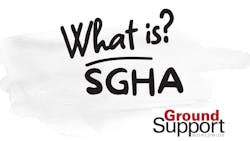What is IATA's Standard Ground Handling Agreement?

The International Air Transport Association (IATA) produces its Standard Ground Handling Agreement (SGHA) to assist ground service providers when agreeing to contracted services with airlines.
The SGHA is comprised of three sections – the main agreement; Annex A, which includes a list of services; and Annex B, which details location, services agreed upon, negotiated details and charges.
“SGHA is published as an industry template, which serves as a baseline for your negotiation of the ground handling services,” Iva Pluhackova explained during an IATA webinar titled Taking a Closer Look: Standard Ground Handling Agreement.
“It is published in the Airport Handling Manual (AHM), which stands as an IATA documentation as a recommended practice (RP 1690, published under the passenger service conference),” she added. “Within (the) Airport Handling Manual, there is a chapter – AHM 810 – which actually includes the standard ground handling agreement.”
The SGHA is revised on a five-year cycle, using input from the industry and assigned working groups to enhance the document.
“The standard ground handling agreement is part of AHM. It's under the passenger conference remit. It is developed by the subject matter experts for procurement and commercial law. We have a ground operation standard working group, which have four subgroups,” Pluhackova explained. “One of them is the subgroup ‘contracts,’ consisting of airlines and ground handlers.”
“We are working on updates based on the submission from the industry based on the most common questions during the training, which we provide, or wherever we receive input that needs to be a change in clarification,” she added. “We work mainly on principle of consensus, so we debate those changes … until both sides find some compromise solution.”
The latest revisions were published in the 2023 version of the SGHA.
“Between revisions, we are publishing AHM 811within (the) Airport Handling Manual. We call it Yellow Pages and any changes which we are making to the upcoming revision, we are putting there as an optional text,” Pluhackova said. “It's not very popular or not very well known, and we would like to promote it more. It means that everything what is 811 will become a new revision part of the contract. And you already have the option to include it into your agreements, which you are using.”
What’s Coming in 2028
The next update to the SGHA will be published in 2028. Pluhackova noted for the 2028 SGHA revision, collaborators are reviewing the structure of Annex B, including merging information for Annex A with language from Annex B; reviewing references to the main agreement, the preamble and references of Annex A items.
“So what we are working on in SGHA 2028, we are starting to review actually Annex B’s structure. We have an ongoing debate about Annex B and a simplified version. They look similar … Is there any opportunity to for us to make the contact simpler and maybe merge them both into one for easy use?” Pluhackova said.
“We are also looking how we are referencing the main agreement in Annex B. What are the preambles, as well as how to reference the services from Annex A in Annex B. There are different styles, we have some recommendation in AO1. However people or companies tend to copy/paste everything, so we have some recommendation on how to do it.”
Pluhackova added another key topic is the standardization of any amendments to contracts.
“We have done some research. Some companies use site letters, (there are) some companies who didn't do appendices,” she said. “We are trying to standardize what an amendment should include as a master item, and we will publish it in a form of guidance.”
IATA relies on feedback from its members to continue evolving the SGHA to meet the industry’s needs.
“We are very interested in your opinions. So, if you have any proposal, please send it to us. You are the main driver of the changes,” Pluhackova said.
“There is an email address [email protected]. Please provide us the SGHA provision you think needs to be changed, amended or included; what the issue is it; what the issue is with that provision; and what you think is a proper solution from your site,” she continued. “There is also a form on IATA’s web pages, which you can submit any proposed changes.”
About the Author
Josh Smith
Editor
Josh Smith served as editor of Ground Support Worldwide as editor from 2016 through 2024. He oversaw production of the print magazine, created GSW's newsletters on a daily basis, and updated the latest news on AviationPros.com.
